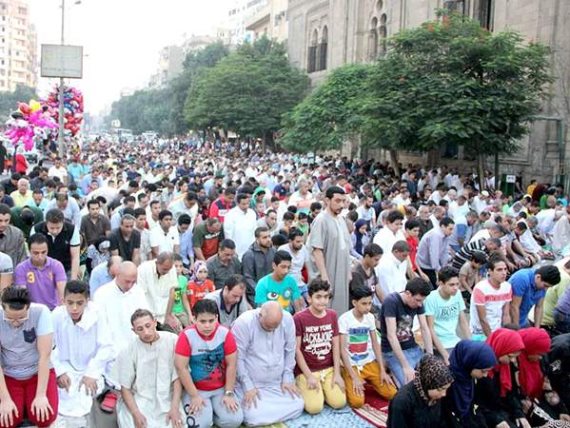At a seven-star hotel, thousands of guests gather to attend the wedding of celebrity Safi Selim and prominent Egyptian-American doctor Sherif Rasekh. For hours, the cream of society indulges in dancing and drinking in an exceptionally opulent and jovial environment. But the occasion ends shockingly: The bride is stabbed in the neck in her suite a few hours after the ceremony. And the killer's identity is unknown.
With this thrilling plot, “Ahl Cairo” or “The Cairenes” television serial has attracted millions of Arab viewers during Ramadan, and stands out as one of the best among at least thirty drama shows this season. It is not just the suspense that distinguishes the show, but its ugly portrayal of Cairo’s upper class–a community the director represents as plagued by promiscuity and the notorious marriage between power and money.
The show, which broadcasts on at least five satellite channels, exposes the grave social chasm that has opened up in Egypt in recent years leaving nearly 40 percent of the population trapped in poverty. “Ahl Cairo” offers a controversial account of social mobility in this highly fragmented society though the character of “Safi Selim,” or Amina.
Amina is a lascivious girl who grew up in a poor family in Cairo’s al-Qalaa neighborhood. As soon as she began studying mass communication she mingled with classmates from a far higher social stratum, who eventually helped her become an advertising model and then a movie star.
Her sex appeal allowed her to seduce politicians as well as businessmen who became entwined in secret affairs with the irresistible young lady. Thanks to this social network, Selim accumulated tons of money and conquered the ranks of Cairo’s westernized elite. Eventually, she married rich. But the marriage was short-lived, as the husband found out about his wife’s promiscuity through watching a DVD of her in bed with a business tycoon. The husband left, and shortly after Amina was found murdered in her room.
This curious crime brings in the series' protagonist, Hassan Mahfouz. Mahfouz is an honest, dedicated and risk-taking policeman who remains speechless when an audacious suspect accuses him of belonging to an institution implicated in human rights violations. He is assigned to investigate the murder of this controversial actress.
“This is the famous theme known as ‘crime at a party,’” says drama critic Rami Abdel Razek. “It is about a crime that happens at a party and there is multiple evidence that suggests that each and every character could be the criminal, yet the perpetrator is just one person. Nevertheless, all characters are portrayed as guilty toward society.”
The show’s plot revolves around Hassan’s journey to find the murderer. He finds an abundance of evidence pointing to the prominent businessman Nadim Kamal, who enjoys political leverage and who had an affair with the victim in the past. To defend himself, Nadim proves that he was at a business meeting with an Israeli delegation while the crime was committed.
With such a defense, the investigation becomes more complex. Mahfouz continues to come across more evidence that suggests the involvement of more players.
According to Abdel Razek, the show seems inspired by many recent scandals that made headlines in local and international press in connection with the promiscuity of businessmen. The most notable of these incidents was the murder of the Lebanese singer Suzanne Tamim whose throat was slit in her house in Dubai in summer 2008. The murder turned out to be instigated by parliamentarian and real estate tycoon Hesham Talaat Mostafa. In 2009, he was handed down a death sentence. He appealed, and the final verdict is still to be handed down.
“The writer’s reading of the relationship between actresses and businessmen and ambitions of social mobility in some classes is good, but it does not say anything new,” says Abdel Razek. “Drama should offer something that goes beyond what is being said in talk shows and the press.”
Yet, Abdel Razek acknowledges that Belal Fadl (the screenwriter)'s reading of the in-and-outs of the privately-owned media is an innovative portrayal of a zone that has never been examined so closely until now.
“As a veteran journalist, Belal Fadl is capable of portraying the backstage of the press well,” he says.
In the show, Fadl dissects the local press by examining the plight of Dalia, a young, talented and conscientious reporter at a privately-owned daily. She outscooped her competitors with her coverage of the killing of Safi Selim thanks to Mahfouz, who entrusted her with confidential information.
Yet, her scoops usually run the risk of being manipulated by her opportunist and hypocritical editor. Through daily feuds between Dalia and her boss, “Ahl Cairo” seems to convey the writer’s disillusionment with the rising so-called independent press.
Unfortunately, Fadl, who is out of the country, could not comment.
His work is one of a few television serials that have manifested a high level of political drama this year. While “Ahl Cairo” zooms in on Egypt’s elite, "Al-Hara" or "The Alley" dissects the plight of Egypt’s slum population which languishes in poverty and ignorance.
Unlike previous shows, the content of this year’s TV dramas no longer relies on political undertones or insinuations. Instead, writers convey explicit political criticisms of the government. For example, anti-government protests are common scenes in some of this year’s shows.
For Abdel Razek, this is a flaw that attests to the weakness of scriptwriters.
“This politicization is not new," he says. "What is new is that the politicized drama has become more direct than what we had in the 1980s and 1990s.”
“Unfortunately, today’s drama is rhetorical and direct…rhetoric is the disease of any drama show no matter who the writer is,” Abdel Razek adds.
For many critics, redundancy is another evil of “Ahl Cairo”.
“This beautiful work is missing condensation. Many scenes that do not serve the main events should have been omitted,” wrote Lilas Souidan in Kuwati paper Al-Qabas this week.
But such redundancy has not dissuaded viewers from following the show anxiously, hoping to know who the murderer is in the next couple of days as Ramadan nears its end.




